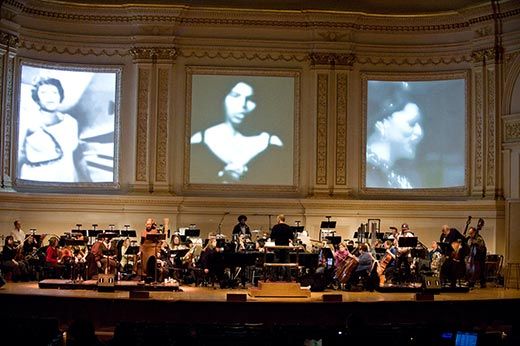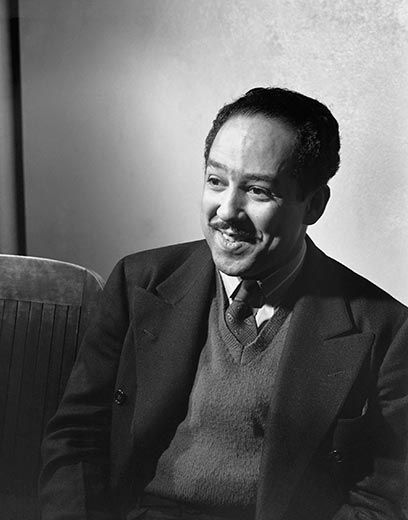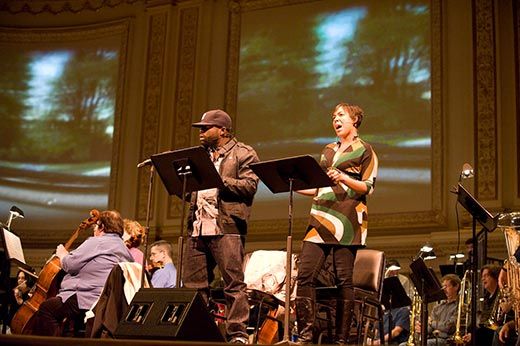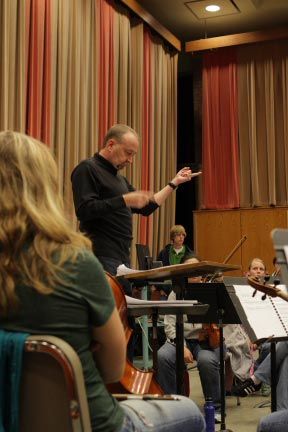A Jazzed-Up Langston Hughes
A long-forgotten poem about the African-American experience is given new life in a multimedia performance
/https://tf-cmsv2-smithsonianmag-media.s3.amazonaws.com/filer/Langston-Hughes-631.jpg)
“The words need to float above the orchestra,” composer Laura Karpman instructs world-renown soprano Jessye Norman who is singing passages of Langston Hughes’ most ambitious though nearly forgotten work, his 1960s epic poem Ask Your Mama: 12 Moods for Jazz. Sitting in folding chairs in a Carnegie Hall rehearsal room, Norman and Karpman, along with mezzo-soprano Tracie Luck and jazz vocalist de’Adre Aziza, prepare for the first major performance of Hughes’s jazz poem, which premieres on March 16 at the historic theater.
“Of course,” replies Norman, who has sung at the hall dozens of times. She lifts her chin, and in the voice that has thrilled millions of grand opera lovers the words take flight, soaring to the rafters. But this music isn't about a tragic heroine; it's about the African American experience.
Luck and Aziza join in, the three distinct voices merging and separating as the piano accompanist plays a stripped-down version of Karpman’s multi-layered score.
Diamonds in pawn
(And I never had a diamond
in my natural life)
Me
In the White House
(And ain't never had a black house)
Do, Jesus!
Lord!
Amen!
They repeat the “Amen” several times, then erupt in laughter and smiles. The lines resonate with everyone in the room. Hughes’s phrase “Me in the White House” seems both funny and prescient just a month after the inauguration of the first African-American president.
Hughes’s Ask Your Mama is playful and serious all at once. He teases the reader by couching his verse in the black urban expression known as the “dozens," but the work is intended to dig deep into the American consciousness. Hughes’s biographer, Arnold Rampersad, describes the sardonic verbal jousting as "a familiar ritual of personal insult in the black American world.” The title of the poem is a “dozens” riposte and is repeated throughout the work.
They asked me at the PTA
Is it true that Negroes—?
I said, ask your mama.
Hughes began the cycle of poems after witnessing white youths rioting at the 1960 Newport Jazz Festival because the performances were sold out. Perhaps he saw the irony in the fact that whites were now fighting for the right to see black performers and sensed a shifting of old ways. When Ask Your Mama: Twelve Moods for Jazz appeared in 1961, the collection was largely ignored by reviewers and the public, according to Rampersad. Shortly after Hughes death, the book went out of print and only a few small-scale performances have been staged.
“The poem amounts to a bristling challenge to the established American social and political order,” Rampersad says in the introduction to the recent reissue of the Hughes biography. Hughes, who died in 1967, seems keenly prophetic. Writing 50 years ago, he imagined a future when “Martin Luther King is governor of Georgia” and “wealthy Negroes have white servants.”
The Ask Your Mama production is part of “Honor!” a three-week festival on African American music commissioned by Carnegie Hall and curated by Norman. “There are kids today who are making hip hop and rap who are too young to have had any personal knowledge of the sixties,” she says. “I want them to understand that what they’re doing has grown out of something very old.”
Collaborating with Karpman, the Emmy-winning composer of the PBS series The Living Edens, Norman seems primed to deliver a multimedia tour de force with jazz, opera and world music as well as film and spoken word. In addition to Luck and Aziza, the concert features the hip-hop band The Roots, who recite passages and provide their signature percussion. Vintage clips of films and entertainers play on several big screens behind the orchestra, and visual artist Rico Gatson provides a kaleidoscope of images of African American artists and leaders. Hughes makes an appearance via film and audio recordings of him reading the poem. After the Carnegie Hall debut, the show travels to the Hollywood Bowl for an August 30 show and then to Baltimore on February 4-6, 2010 for a performance with the Baltimore Symphony.
Although Norman did not know this particular Hughes work, her mother, a schoolteacher, had introduced her to many of his popular poems such as “The Negro Speaks of Rivers.” Upon reading Ask Your Mama, Norman was struck by the poet's "soundtrack of the world in the sixties.” His margin notes call for familiar gospel songs and jazz standards. He riffs on "lovely leider Leontyne," in homage to opera great Leontyne Price. The shout-outs to political leaders, sports heroes and newsmakers of the era, like Jackie Robinson and Emmett Till, still resonate. “There are call-outs of these names,” Norman says, “names that everyone should know, because they increase the understanding of the meaning of civil rights.”
Karpman, the piece’s composer, was raised on bebop as well as Beethoven. Having played jazz and scatted while a graduate student at Juilliard, she feels in sync with the jazz sensibilities of Ask Your Mama. “The thing that was so attractive about it," she says, "was that in the right hand margins of the text, Langston actually said how the music should sound. He creates kind of a sonic landscape for the poem. For me that was just irresistible.”
She opens the book to one of Hughes’s directions: “Delicate leider on piano continues between verses to merge softly into the melody of the ‘Hesitation Blues.’” She follows the cues, but notes that “Hughes has left a lot of room for interpretation.”
Karpman turns to her singers. “Could you bleed over into the rests following Miss Norman’s lead?” A humidifier on a table nearby silently blows moisture to protect the singers’ voices from the hot, dry air of the heated room. Luck and Aziza nod and listen for Norman’s lead.



